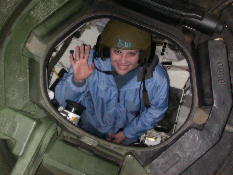December 28, 2005
This is how it came to be that I felt a great excitement and inner peace for 24 hours. I learned of the oscillating universe theory.
I've never been a person who thinks much about the meaning of life or why we're here. I've always found more solace in thinking that I'm a small being in an ever-changing cosmos, that there's nothing more special about me than some long-extinct triceratops. I find peace and comfort knowing that the universe is far more complex and wondrous than I could ever comprehend, and that my life is inconsequential in the big scheme of billions of years. This thought that my life is but a blink in time helps me cope with seemingly monumental stressors in my life: high schoolers, deployments, the fact that the coat I wanted from Land's End is discontinued. All of this pales when I think about what has come before and will come after me.
In 1979, Carl Sagan said there was not enough evidence to rule out an oscillating universe. This would mean that the universe could continue a series of collapses and big bangs, in a neverending accordion squeeze on the cosmos. And I liked that idea. As I lay in bed, I imagined another go-round for the universe, with planets at different distances from their stars, possibly fostering new and different life forms. Or not. I imagined the cosmos as a big game of Yahtzee, then laughed that maybe God really does play dice with the universe. I felt excited and at peace, and I wanted to learn more.
So does learning that there's probably not enough matter in the universe to cause a Big Crunch make me disappointed? A little, but I'd rather know the truth. I suppose it doesn't even really bother me that the universe appears to be speeding up and eventally all stars will flicker out and cease to be. If that's what really will happen, then I can accept that.
But boy, did my mind do cartwheels at the thought of an oscillating universe. That was a great feeling, even if it was short lived.
Posted by: Sarah at
06:24 AM
| Comments (1)
| Add Comment
Post contains 445 words, total size 3 kb.
Posted by: piercello at December 29, 2005 09:25 PM (vBvTr)
49 queries taking 0.064 seconds, 198 records returned.
Powered by Minx 1.1.6c-pink.














